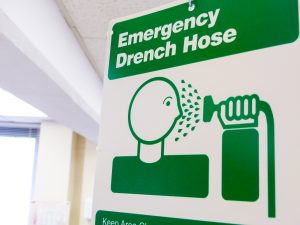Goals and Entry-Level Competencies
Program Goals
Upon completion of the UNC-Chapel Hill Bachelor’s of Science in Clinical Laboratory Science, CLS graduates will be prepared to:
- Work as entry-level clinical laboratory scientists.
- Continue to learn throughout their professional careers.
- Use ethical standards to guide professional behavior and judgments.
- Communicate effectively with other health care providers.
- Serve as leaders in the clinical laboratory profession in technical, educational, research and administrative roles.
Entry-Level Competencies:

The educational experiences in the UNC-CH CLS program are designed to ensure that students are well prepared to enter the profession of Clinical Laboratory Science and continue to learn throughout their professional career. At the completion of the UNC CLS program, students will be able to:
- Perform and evaluate pre-analytical, analytical, and post-analytical procedures to ensure the quality of laboratory results.
- Perform laboratory tests, analyze and verify results, and resolve common problems in all the major areas of the clinical laboratory.
- Explain the principles and methods used in laboratory tests in all major areas of the clinical laboratory.
- Explain the clinical significance of laboratory procedures in diagnosis and treatment of disease and maintenance of health.
- Correlate information from different laboratory departments to verify results or resolve problems.
- Evaluate patient results and suggest or select appropriate additional testing.
- Determine the priority of laboratory requests and arrange the workload for optimal patient care and efficiency.
- Obtain acceptable blood samples for laboratory tests using standard phlebotomy procedures.
- Use quality assurance principles and practices to ensure the accuracy and reliability of laboratory information.
- Perform preventive and corrective maintenance of equipment and instruments.
- Use the principles of method evaluation to select new techniques and instruments.
- Explain and apply the major principles and practices of laboratory administration, supervision and budgeting.
- Explain and apply principles of effective test utilization.
- Comply with all standard safety regulations and monitor changes in safety regulations.
- Use educational methods to present information and develop instructional materials.
- Use computer systems to produce documents, research information, communicate with others and enter and retrieve laboratory information.
- Apply principles of management to the acquisition and evaluation of laboratory information systems.
- Communicate effectively with laboratory personnel, other health care professionals, patients and the public.
- Demonstrate professional conduct and interpersonal skills with patients, laboratory personnel, other health care professionals and the public.
- Demonstrate ethical standards in all matters related to medical information and patient care.